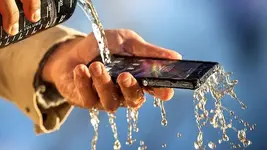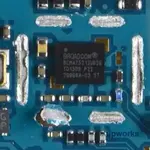Your GPS chip (actually it's a full GNSS processor) on the S4 is actually quad band which helps it be more reliable with it's limited horizon. It's not limited to GPS or GLONASS.
There is no locational advantage to GLONASS. GLONASS has the same horizontal accuracy as GPS. GPS is accurate to 7.8 meters (25+ feet) @ 95% reliability SIS. Since you are not SIS your actual GPS accuracy is closer to 10 meters @ 95% reliability. (It's that last 5% that kills overconfident GPS users). The GLONASS system is a little less accurate in the vertical (z axis) than GPS.
The accuracy comes from using WAAS - not the GNSS bands themselves. Number of Satellites and sample rates also play a significant part in reaching the system accuracy potential. The antenna used and it's placement are high on that list and of course radiation, angle, and cover both local and atmospheric play a significant part in any single readings accuracy.
Here is your S4 GNSS (GPS) chip. It's the most advanced GNSS processor available for phones today. Tomorrow that title will probably be with another company.
View attachment 929138
Quoting processor speeds or static memory doesn't help decide how good the locational ability is. The fact that you can choose an OS or screen color doesn't have anything to do with GPS functionality.
Even Samsung doesn't put much faith in the differences in processors or 32 bit/64 bit discrepancies. The S4 was reviewed based on the Korean model that uses the much faster quad hi/lo Broadcom 64 bit processor instead of the simpler quad Snapdragon 600 32 bit 64 bit simulator. There are other significant differences not shown in your advertising cut and paste.
If Samsung would post the sample rates or number of satellites or how the dual tuned wifi/gps antenna strand performs compared to a dedicated design or how their geofencing capability compares to a dedicated system that has no need of transitions, or about 12 other major items that make a real difference we might be talking apples to tree fruit instead of downloadable apps to locational ability.
Even granting you the specs may one day be the same in electronics I think smart phones will still be providing you with GPS as a bonus feature for sales sake. In any case they have a long way to go before you can run over your smartphone with a jeep and still have a good functioning GPS unit with another 16 hours to go before you need to replace the two off the shelf 35 cent batteries. Real world experience.
Lets just agree that a Samsung S4 is a true marvel of modern technology with some good GPS capability. Claiming accuracy figures that are better than GPS commercial standards or confusing processor "speeds" with GPS capability does nothing to boost the actual capability of what is probably the most GPS capable "smart phone" available today.
GPS is getting more accurate every year but very little of that improvement is due to the commercial or phone chips in use. Those improvements look to be ongoing for several years so we can expect to see even older GPS units get more accurate over the same time frame. Lots of moving targets out there.
If it's any consolation my Garmins, DeLormes and Trimbles really fail in the movie playing, music and phone department. Although that could be changing soon. Eventually it probably won't matter whether you get your locational information from a phone or a dedicated unit or your toaster. For now smart phones are still playing catch up with dedicated GPS units in general. Or maybe GPS units are playing catch up with audio communications technology.

I write software for several types of GPS units (including "smart" phones) and there is no reason the Garmin system couldn't support a phone or a music player if you added a few cheap chips and some waterproof speakers. I wouldn't write off Garmin's "modern" capabilities just yet.








